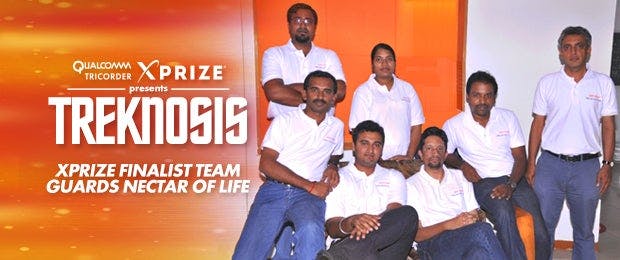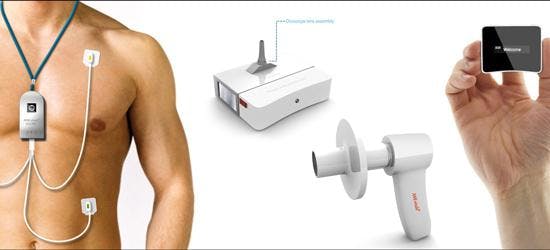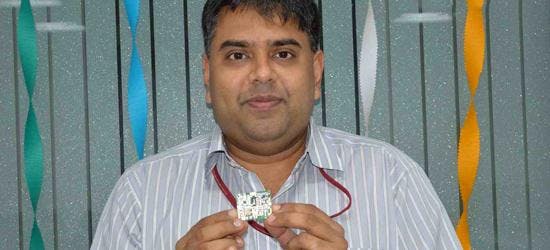Published Oct 27, 2014
Qualcomm XPRIZE Finalist Team Guards Nectar of Life
Qualcomm XPRIZE Finalist Team Guards Nectar of Life

“For 45 years, Star Trek has been an inspiration for thousands of scientists and engineers, and continues to inspire hundreds of Trekkies like us to improve and create technology, which would benefit mankind as a whole...”
Sridharan Mani wants to put more life in your life. He's not talking about something as simple as adding more years — he means to pack more quality and vitality into the one you've already got. "Life should be enjoyable; I am not a big believer in making people dependent on pills and procedures that suck their energy out and make them unable to enjoy even one second of their life," he said. Not so surprising coming from the person leading a finalist team in the Qualcomm Tricorder XPRIZE competition named for Danvantri, the divine Hindu physician who guards the nectar of life itself.

Mani's mission is a good one; so how do we get there? He's a strong advocate of preventative care. Think of your car's dashboard, he says: it'll tell you if you've got a leak, or when your oil needs changing. Our bodies need something similar. "Identifying small problems before they become big and fixing them then and there — that's what medicine should be," he argues. "When you have the symptoms of diabetes, for instance, that's when cell and organ damage has already set in. You can treat it then, but it's expensive and arduous. If you catch it early enough, you can prevent it without compromising your lifestyle."
Catching disease conditions before they start would be a huge win. "If I can help people with prevention at an early age," Mani notes, "they'll be happy later on in life, and don't have to spend so much on healthcare." Of course, such a strategy has its own built-in obstacles. "When you're young," he says, "you think everything's good." Mani's done the research, though, and it's not great: four people a minute die of heart attacks in India between the ages of 30-50. A full quarter of those occur in people under 40. Things like heart disease and high blood pressure can be silent killers with invisible symptoms; a normal person won't know they have it until something terrible happens, at which point it's too late for prevention. That's where a medical tricorder and the monitoring it makes possible come in.
"We're making a very small device you can put in your pocket and go," Mani says. Team Danvantri's solution is packed with sensors that include a pedometer and built-in camera. "We're trying to make it as simple as possible," he explains. "I don't know how many people would like to carry a device with them, saying 'See, I'm checking my health every second!' We want to make it more like a lifestyle device. We give you a pedometer with a nice look and feel, but it does many other things, too." At the end of the day, Mani points out, it should not only be something people like to carry with them, but that they're glad to have around: "What's fun in telling people they're not healthy? Instead, what about: here are a few areas you can work on that will help you feel better." It goes the other way, too: stress can be just as deadly a silent killer. "If I have a lifestyle coach who's always in my pocket, telling me 'Hey buddy, slow down, take a break, you're doing fine,' that's really encouraging," he added.

More consistent monitoring helps doctors, too. When you go see a doctor, typically you can only give them one point of data, which isn't great when you're trying to draw a complete picture.
Team Danvantri is made up of engineers from American Megatrends, which might be a familiar name if you've ever watched your computer boot, and it shows in the analogy Mani makes: "In a debugging system," he says, "in software or hardware terms, when we're trying to find an error, we can look at the source code, find where the error is, and fix it. But when it's out, it's in runtime and in control of the users — and when users encounter a runtime error, it's very hard to find it in one instance. We ask for more data: when did you run it? Under what conditions? Often we get nothing. Doctors today are diagnosing with one data point; that's why diagnoses go wrong so often." And that's only part of the problem: a patient trying to get a complaint across to a doctor might focus on the wrong thing or not describe symptoms accurately. Would it be possible to take human error out of the equation?
The start of the competition found Mani already working with hospitals, trying to figure out how to get quality healthcare to the 800 million living in rural areas of India without regular access to doctors. Smartphone penetration across the country is very high, so going with a mobile-based strategy seemed like a clear winner. Mani, who's quite active on LinkedIn, found an article there about the Qualcomm Tricorder XPRIZE competition — and that's when Vivek V, one of the engineers on his team, and an avowed Star Trek fan, "started jumping up and down."
Most of Mani's team knew about the Ansari XPRIZE for suborbital spaceflight from back in the day, so just getting into the competition was a huge achievement for them all on its own. Making it to the top ten? A dream come true. In Vivek's own words: "For 45 years, Star Trek has been an inspiration for thousands of scientists and engineers, and continues to inspire hundreds of Trekkies like us to improve and create technology, which would benefit mankind as a whole. More than anything, I guess it is Gene Roddenberry's hope for humanity that we as a species would continue to improve in both our technological powers and our humanity: overcoming artificial boundaries and believing in a future of tolerance and acceptance. Boldly going where no one has gone before, so to speak, and not to a dystopian future where terminators run amok, is the biggest inspiration of them all."
Of course, there have been challenges. The human body delivers signals in electrical strengths measured in millivolts or microvolts. Mani says of his team's device: "You're seeing v10 or v11 — we had so many versions because we've been working on this for two years now. If you were looking at our first version, you'd find it very funny. We thought we'd finish in a week!" Waking up from the belief that everything is easy was a big surprise.
"Initially when we started, we thought we were building a device that would help cure people, but more and more we realized that it's not the device that's needed, it's the whole healthcare system that needs changing," Mani argues. "Because today, we're only talking about cures, but we should be talking about how not to get affected — prevention, early warning. To cure is very expensive; people may get cured, but it puts long-term financial stress on them, whereas prevention is cheap. Prevention even helps you make more money — if I can add five to ten years of happy, healthy life to someone, then that person can be more productive and his whole life is lived fully."
More life is what Mani wants... for everyone. More real living. "On their deathbed, everyone should be able to feel 'I lived my life to the fullest, with no compromises made,' he insists. "If I can bring down the number of people dying because of unknown symptoms that led to their death, or if I can help people live a happy and longer life, then I will feel that I've achieved something with our device."--Jon Sung is a contributing writer for XPRIZE and copywriting gun-for-hire to startups and ventures all over the San Francisco Bay area. When not wrangling words for business or pleasure, he serves as the captain of the USS Loma Prieta, the hardest-partying Star Trek fan club in San Francisco.XPRIZE is an innovation engine. We design and operate prize competitions to address global crises and market failures, and incentivize teams around the world to solve them. Currently, we are operating numerous prizes including the $30M Google Lunar XPRIZE, challenging privately funded teams to successfully land a robot on the Moon’s surface, and the $10M Qualcomm Tricorder XPRIZE, challenging teams around the world to create a portable, wireless, Star Trek-inspired medical device that allows you to monitor your health and medical conditions anywhere, anytime. The result? Radical innovation that will help us all live long and prosper.Sign up today to join our mission, be a part of our campaign and win collectibles at: tricorderfederation.org.




